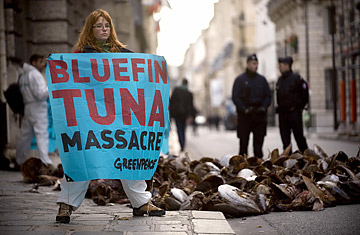
A Greenpeace activist holds a banner in front of tuna that the group dumped in front of the French Agriculture Ministry in Paris on Nov. 17, 2008
For years, environmental organizations like Greenpeace and the World Wildlife Fund (WWF) have warned that overfishing could cause bluefin tuna to go the way of dinosaurs and dodos. Now the European Commission says it agrees with that grim assessment. In a compromise that unites Europe's departments of environment and fisheries, the commission lent its support to a proposal that, barring new scientific evidence, would list Atlantic and Mediterranean bluefin as an endangered species — and therefore ban its trade — for two years. "This decision marks an important step in the protection of Atlantic bluefin tuna," Stavros Dimas, environment commissioner, said in a press release after the agreement was reached. "We must act on the best scientific evidence available to us — and scientists say that urgent action is needed to safeguard the future of one of the ocean's most emblematic creatures."
According to the International Commission for the Conservation of Tuna (ICCAT), a Madrid-based organization that regulates tuna fishing among most countries that engage in it, breeding stocks of bluefin tuna have declined to below 40% of their 1970 levels, with the steepest drop occurring in the past five to 10 years. Much of the problem lies with the runaway market for sushi and the illegal fishing that exploits the profits it offers. Some scientists, like Brian MacKenzie of Denmark's National Institute of Aquatic Resources, have suggested that at the current levels of fishing, the collapse of bluefin stocks in the eastern Atlantic and Mediterranean is imminent.
The commission agreement supports the proposal, sponsored by the tiny Mediterranean principality of Monaco, to the Convention on International Trade in Endangered Species (CITES) that Atlantic bluefin be included on a list of endangered species. The listing would automatically prohibit trade in the fish. If the commission's agreement is approved by a majority of the E.U.'s member states later this month — and some governments, like France, Germany and Britain, have already expressed their support — Europe's stance will add weight to moves for a worldwide ban when CITES gathers to vote on the measure in March 2010.
The proposal was necessary, wrote Monaco's Prince Albert in a letter published in the Wall Street Journal, because ICCAT had failed to protect the tuna population, setting quotas higher than those recommended by its own scientists and turning a blind eye to illegal fishing. CITES would be a more appropriate regulatory body than ICCAT, Albert noted, because it "is presided over by trade and environment ministers, rather than fisheries ministers."
But it was the European Commission's powerful Fisheries Department that made this latest agreement possible. The Fisheries Department has long resisted calls for a ban. This time, though, the available statistics made a moratorium seem at least provisionally necessary, says spokeswoman Nathalie Charbonneau. "We have management and recovery plans in place, whose goal is to create sustainable fisheries that still allow for economic profit. But for the time being, the latest scientific evidence reminds us that if there are no more fish resources, there won't be any economic resources."
Environmental groups were thrilled by the news. "It's a very brave decision," says Aaron MacLoughlin, the World Wildlife Fund's head of European marine programs. "For fishing nations like Malta and Greece to reach this agreement takes courage."
But people within the tuna industry see pressure tactics, rather than courage, at work. "The lobby formed by WWF, Greenpeace and others is too strong to resist," says David Martínez Cañabate, adjunct director for the Ricardo Fuentes Group, Spain's largest tuna farming and distribution company. "We put so much money and effort into coming up with a recovery plan within ICCAT, and it was producing results. But now it means nothing. Because according to those groups, the only option is to close the fishery — they won't consider other options."
Charbonneau says the commission is still considering other options — like the possibility that ICCAT's newest data, which is scheduled to be released in November, will show enough recovery to make the ban unnecessary. But given ICCAT's track record of failing to evenly enforce its own limitations, WWF's MacLoughlin doesn't see that as a likely outcome. "Maybe in the E.U. the quotas are working," he says. "But as long as you've got countries like Libya where the major commercial interest in the industry is controlled by the leader's son, and there's no respect either for science or for the rule of law, a temporary ban on all trade is going to be the only way to save the fishery."
Fishermen remain unconvinced. José López hasn't had time to read the commission's agreement but is concerned with it nonetheless. President of a group called Friends of the Tuna — which unites practitioners of the almadraba, an ancient, artisanal method of tuna fishing in the Mediterranean — López was busy on Sept. 9 preparing a talk for the organization's annual conference. The planned program for the gathering — which will bring almadraba fishermen from Spain, Portugal, Italy and Morocco to the Andalusian town of Isla Cristina on Sept. 11 — includes sessions on everything from the different types of boats used to the traditional uses of unlikely tuna parts (eyes, it seems, contain an excellent oil). "But you can bet the ban will be a major topic of conversation," López says. "These people want to know if they're still going to have a job next year."
